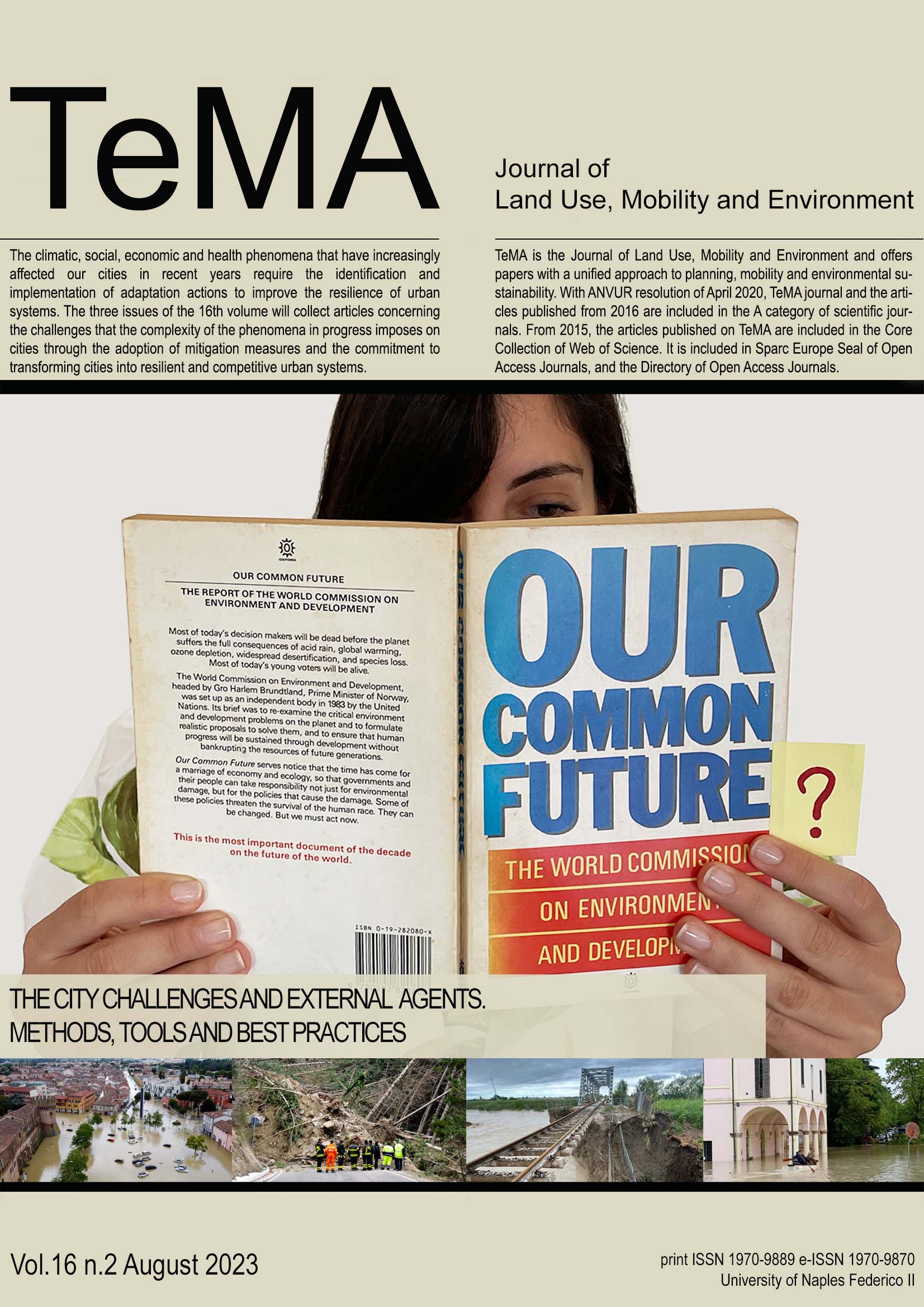City vs Energy consumptions: Energy Communities in Italy
Abstract
Starting from the relationship between urban planning and mobility management, TeMA has gradually
expanded the view of the covered topics, always remaining in the groove of rigorous scientific in-depth
analysis. This section of the Journal, Review Notes, is the expression of continuously updating emerging
topics concerning relationships between urban planning, mobility and environment, through a collection of
short scientific papers written by young researchers. The Review Notes are made of four parts. Each section
examines a specific aspect of the broader information storage within the main interests of TeMA Journal.
In particular, the Urban Practices section aims at producing, analyzing and reporting data on recent and
relevant policies in the urban domain.
This contribution aims at delving into the Energy Community paradigm and its application into the Italian
context. The concept of energy communities has gained significant attention and recognition in both the
European and Italian contexts. These communities are based on the idea of decentralizing energy
production and fostering local participation in the transition to renewable energy sources. Since only recently
the legislative panorama provided a set of limits and opportunities to the implementation of energy
communities, this note is dedicated to some of the most interesting spontaneous experiences recently born
in Italy, to highlight their strengths and weaknesses.
Downloads
References
Al-Thani, H., Koç, M., Isaifan, R. J., & Bicer, Y. (2022). A Review of the Integrated Renewable Energy Systems for Sustainable Urban Mobility. Sustainability, 14(17), 10517. https://doi.org/10.3390/su141710517
Ceglia, F., Marrasso, E., Pallotta, G., Roselli, C., & Sasso, M. (2022). The State of the Art of Smart Energy Communities: A Systematic Review of Strengths and Limits. Energies, 15(9), 3462. https://doi.org/10.3390/en15093462
Derkenbaeva, E., Vega, S. H., Hofstede, G. J., & Van Leeuwen, E. (2022). Positive energy districts: Mainstreaming energy transition in urban areas. Renewable and Sustainable Energy Reviews, 153, 111782.
https://doi.org/10.1016/j.rser.2021.111782
Fasolino I., Grimaldi M., & Coppola F. (2020). The paradigms of urban planning to emergency-proof. TeMA - Journal of Land Use, Mobility and Environment, 165-178. https://doi.org/10.6092/1970-9870/6912
Gargiulo, C., Sgambati, S., Zucaro, F. (2023). The Analysis of the Urban Open Spaces System for Resilient and Pleasant Historical Districts. In: Gervasi, O., et al. Computational Science and Its Applications – ICCSA 2023 Workshops. ICCSA 2023. Lecture Notes in Computer Science, vol 14106. Springer, Cham. https://doi.org/10.1007/978-3-031-37111-0_39
Lode, M. L., Te Boveldt, G., Coosemans, T., & Camargo, L. R. (2022). A transition perspective on Energy Communities: A systematic literature review and research agenda. Renewable and Sustainable Energy Reviews, 163, 112479. https://doi.org/10.1016/j.rser.2022.112479
Papa R., Gargiulo C., & Zucaro F. (2014). Urban Systems and Energy Consumptions: A Critical Approach. TeMA - Journal of Land Use, Mobility and Environment.
https://doi.org/10.6092/1970-9870/2552https://doi.org/10.1016/j.rser.2022.112479
Papa, R., Gargiulo, C., Zucaro, F. (2016). Towards the Definition of the Urban Saving Energy Model (UrbanSEM). In: Papa, R., Fistola, R. (eds) Smart Energy in the Smart City. Green Energy and Technology. Springer, Cham.
https://doi.org/10.1007/978-3-319-31157-9_9
Pilogallo A., Saganeiti L., Scorza F., & Murgante B. (2019). Ecosystem Services’ Based Impact Assessment for Low Carbon Transition Processes. TeMA - Journal of Land Use, Mobility and Environment, 12(2), 127-138. https://doi.org/10.6092/1970-9870/6117
Shirgir E., Kheyroddin R., & Behzadfar M. (2019). Defining urban green infrastructure role in analysis of climate resiliency in cities based on landscape ecology theories. TeMA - Journal of Land Use, Mobility and Environment, 12(3), 227-247. https://doi.org/10.6092/1970-9870/625
Copyright (c) 2023 TeMA - Journal of Land Use, Mobility and Environment

This work is licensed under a Creative Commons Attribution 4.0 International License.
Authors who publish in this journal agree to the following:
1. Authors retain the rights to their work and give in to the journal the right of first publication of the work simultaneously licensed under a Creative Commons License - Attribution that allows others to share the work indicating the authorship and the initial publication in this journal.
2. Authors can adhere to other agreements of non-exclusive license for the distribution of the published version of the work (ex. To deposit it in an institutional repository or to publish it in a monography), provided to indicate that the document was first published in this journal.
3. Authors can distribute their work online (ex. In institutional repositories or in their website) prior to and during the submission process, as it can lead to productive exchanges and it can increase the quotations of the published work (See The Effect of Open Access)

